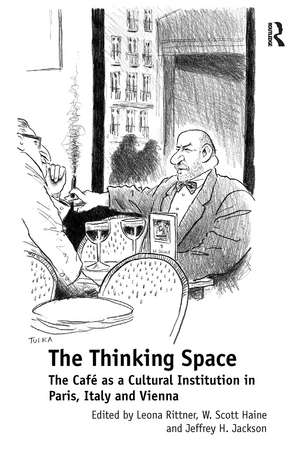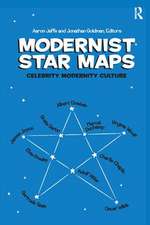The Thinking Space: The Café as a Cultural Institution in Paris, Italy and Vienna
Autor Leona Rittner, W. Scott Haineen Limba Engleză Paperback – 14 oct 2024
| Toate formatele și edițiile | Preț | Express |
|---|---|---|
| Paperback (1) | 260.33 lei 6-8 săpt. | |
| Taylor & Francis – 14 oct 2024 | 260.33 lei 6-8 săpt. | |
| Hardback (1) | 1057.43 lei 6-8 săpt. | |
| Taylor & Francis – 14 iun 2013 | 1057.43 lei 6-8 săpt. |
Preț: 260.33 lei
Preț vechi: 311.59 lei
-16% Nou
Puncte Express: 390
Preț estimativ în valută:
49.81€ • 54.33$ • 42.00£
49.81€ • 54.33$ • 42.00£
Carte tipărită la comandă
Livrare economică 24 aprilie-08 mai
Preluare comenzi: 021 569.72.76
Specificații
ISBN-13: 9781032923628
ISBN-10: 1032923628
Pagini: 252
Dimensiuni: 156 x 234 mm
Greutate: 0.47 kg
Ediția:1
Editura: Taylor & Francis
Colecția Routledge
Locul publicării:Oxford, United Kingdom
ISBN-10: 1032923628
Pagini: 252
Dimensiuni: 156 x 234 mm
Greutate: 0.47 kg
Ediția:1
Editura: Taylor & Francis
Colecția Routledge
Locul publicării:Oxford, United Kingdom
Public țintă
AcademicNotă biografică
Leona Rittner, who died in 2010, was an independent scholar based in New York and published widely on French and Italian literature; W. Scott Haine teaches at the University of Maryland University College; Jeffrey H. Jackson is Associate Professor of History at Rhodes College in Memphis, Tennessee.
Cuprins
Preface; Introduction, W. Scott Haine; Part I Vienna; Chapter 1 The Vienna Coffee House: History and Cultural Significance, Herbert Lederer; Chapter 2 The End of a False Summer: Aspects of Viennese Literary Culture around 1900, Egon Schwarz; Chapter 3 Jewish Modernism and Viennese Cafés, 1900–1930, Shachar Pinsker; Part II Paris; Chapter 4 Bad Places: Sedition, Everyday Speech, and Performance in the Café of Enlightenment Paris, Tabetha Ewing; Chapter 5 From the Spectator to Goldoni: Coffee-house Culture and Wishful Thinking in the Eighteenth Century, Franco Fido; Chapter 6 A Café in the High Time of Haussmannization: Baudelaire’s Confrontation with the Eyes of the Poor, Edward J. Ahearn; Chapter 7 When Objective Chance Takes over Cafés, Gérard-Georges Lemaire; Chapter 8 At the Time of Le Boeuf sur le Toit (The Ox on the Roof) Cabaret, Leona Rittner; Chapter 9 Arguing About Jazz in the Parisian Café: Jazz, Race, and Literary Communities in 1920s Paris, Jeffrey H. Jackson; Chapter 10 Jean-Paul Sartre: Cafés, Ontology, Sociability, and Revolution in Occupied Paris, 1940–1944, W. Scott Haine; Part III Italy; Chapter 11 Art at I1 Caffè Florian, Florin Berindeanu; Chapter 12 Casanova’s Coffeehouse: Sociability, Social Class, and the Well-bred Reader in Histoire de ma vie, Ted Emery; Chapter 13 The Giubbe Rosse Café in Florence: A Literary and Political Alcove from Futurism to Anti-Fascist Resistance, Ernesto Livorni; Chapter 14 The Writer’s Provincial Muse: Piero Chiara in the Coffeehouse, Stefano Giannini; Part IV Reflections; Chapter 15 Three Scenes from Italian Cafés, Fannie Peczenik;
Recenzii
'Across this collection, what emerges is that the café is a site where we can begin to understand not just the relationship between solitude and sociability across time, but also the relationship between speech and place; between speakers and overhearers; between national identity and race; between occupying forces and the occupied; between the elites and the masses. What is hopefully apparent, then, is that while this collection will appeal primarily to scholars of café and literary scenes, it also touches upon ideas of wider interest in historical geography.' Journal of Historical Geography '... provides a fascinating account of ways in which, since the eighteenth century, the intelligentsia of three countries deployed the amenities of the café as part of their professional practice.' European History Quarterly ’...a useful addition for libraries and an important read for anyone doing research on the coffeehouse.’ Contemporary French Civilization
Descriere
The café as an institutional site has been the subject of renewed interest amongst scholars in the past decade, and its role in the development of art, ideas and culture has been explored in some detail. However, few have investigated the ways in which cafés create a cultural and intellectual space which brings together multiple influences and inte









